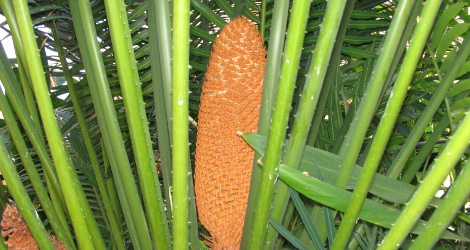
Liu Y., S. Wang, L. Li, T. Yang, S. Dong, T. Wei, S. Wu, Y. Liu, Y. Gong, X. Feng, J. Ma, G. Chang, J. Huang, Y. Yang, H. Wang, M. Liu, Y. Xu, H. Liang, J. Yu, Y. Cai, Z. Zhang, Y. Fan, W. Mu, S. Kumar Sahu, S. Liu, X. Lang, L. Yang, N. Li, S. Habib, Y. Yang, A.J. Lindstrom, P. Liang, B. Goffinet, S. Zaman, Jill. L. Wegrzyn, D. Li, J. Liu, J. Cui, E.C. Sonnenschein, X. Wang, J. Ruan, J.-Y. Xue, Z.-Q. Shao, C. Song, G. Fan, Z. Li, L. Zhang, J. Liu, Z.-J. Liu, Y. Jiao, X.-Q. Wang, H. Wu, E. Wang, M. Lisby, H. Yang, J. Wang, X. Liu, X. Xu, N. Li, P.S. Soltis, Y. Van de Peer, D.E. Soltis, X. Gong, H. Liu, S. Zhang. 2022. The cycad genome and the early evolution of seed plants. Nature Plants 8: 389–401. pdf Google Scholar
Abstract reads: Cycads represent one of the most ancient lineages of living seed plants. Identifying genomic features uniquely shared by cycads and other extant seed plants, but not non-seed-producing plants, may shed light on the origin of key innovations, as well as the early diversification of seed plants. Here, we report the 10.5-Gb reference genome of Cycas panzhihuaensis, complemented by the transcriptomes of 339 cycad species. Nuclear and plastid phylogenomic analyses strongly suggest that cycads and Ginkgo form a clade sister to all other living gymnosperms, in contrast to mitochondrial data, which place cycads alone in this posi- tion. We found evidence for an ancient whole-genome duplication in the common ancestor of extant gymnosperms. The Cycas genome contains four homologues of the fitD gene family that were likely acquired via horizontal gene transfer from fungi, and these genes confer herbivore resistance in cycads. The male-specific region of the Y chromosome of C. panzhihuaensis contains a MADS-box transcription factor expressed exclusively in male cones that is similar to a system reported in Ginkgo, suggesting that a sex determination mechanism controlled by MADS-box genes may have originated in the common ancestor of cycads and Ginkgo. The C. panzhihuaensis genome provides an important new resource of broad utility for biologists.